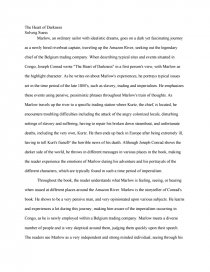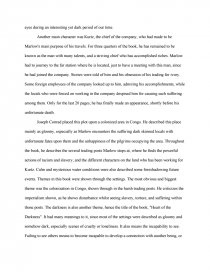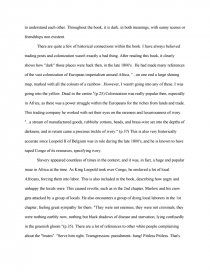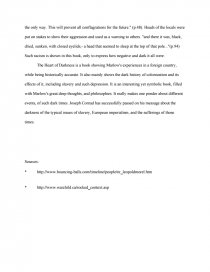The Heart of Darkness
Essay by review • February 7, 2011 • Book/Movie Report • 1,183 Words (5 Pages) • 1,168 Views
The Heart of Darkness
Solveig Suess
Marlow, an ordinary sailor with idealistic dreams, goes on a dark yet fascinating journey as a newly hired riverboat captain, traveling up the Amazon River, seeking out the legendary chief of the Belgium trading company. When describing typical sites and events situated in Congo, Joseph Conrad wrote "The Heart of Darkness" in a first person's view, with Marlow as the highlight character. As he writes on about Marlow's experiences, he portrays typical issues set in the time period of the late 1800's, such as slavery, trading and imperialism. He emphasizes these events using pensive, pessimistic phrases throughout Marlow's train of thoughts. As Marlow travels up the river to a specific trading station where Kurtz, the chief, is located, he encounters troubling difficulties including the attack of the angry colonized locals, disturbing settings of slavery and suffering, having to repair his broken down steamboat, and unfortunate deaths, including the very own, Kurtz. He then ends up back in Europe after being extremely ill, having to tell Kurt's fiancй the horrible news of his death. Although Joseph Conrad shows the darker side of the world, he throws in different messages in various places in the book, making the reader experience the emotions of Marlow during his adventure and his portrayals of the different characters, which are typically found in such a time period of imperialism.
Throughout the book, the reader understands what Marlow is feeling, seeing, or hearing when issued at different places around the Amazon River. Marlow is the storyteller of Conrad's book. He shows to be a very pensive man, and very opinionated upon various subjects. He learns and experiences a lot during this journey, making him aware of the imperialism occurring in Congo, as he is newly employed within a Belgium trading company. Marlow meets a diverse number of people and is very skeptical around them, judging them quickly upon their speech. The readers see Marlow as a very independent and strong minded individual, seeing through his eyes during an interesting yet dark period of our time.
Another main character was Kurtz, the chief of the company, who had made to be Marlow's main purpose of his travels. For three quarters of the book, he has remained to be known as the man with many talents, and a striving chief who has accomplished riches. Marlow had to journey to the far station where he is located, just to have a meeting with this man, since he had joined the company. Stories were told of him and his obsession of his trading for ivory. Some foreign employees of the company looked up to him, admiring his accomplishments, while the locals who were forced on working in the company despised him for causing such suffering among them. Only for the last 20 pages, he has finally made an appearance, shortly before his unfortunate death.
Joseph Conrad placed this plot upon a colonized area in Congo. He described this place mainly as gloomy, especially as Marlow encounters the suffering dark skinned locals with unfortunate fates upon them and the unhappiness of the pilgrims occupying the area. Throughout the book, he describes the several trading posts Marlow stops at, where he finds the powerful actions of racism and slavery, and the different characters on the land who has been working for Kurtz. Calm and mysterious water conditions were also described some foreshadowing future events. Themes in this book were shown through the settings. The most obvious and biggest theme was the colonization in Congo, shown through in the harsh trading posts. He criticizes the imperialism shown, as he shows disturbance whilst seeing slavery, torture, and suffering within those posts. The darkness is also another theme, hence the title of the book, "Heart of the Darkness". It had many meanings to it, since most of the settings were described as gloomy and somehow dark, especially scenes of cruelty or loneliness. It also means the incapability to see. Failing to see others means to become incapable to develop a connection with another being, or to understand each other. Throughout the book, it is dark, in both meanings, with sunny scenes or friendships non existent.
There are quite a few of historical connections within the book. I have always believed trading posts and colonization wasn't exactly a bad thing. After reading this book, it clearly shows how "dark" those places were back then, in the late 1800's. He
...
...



